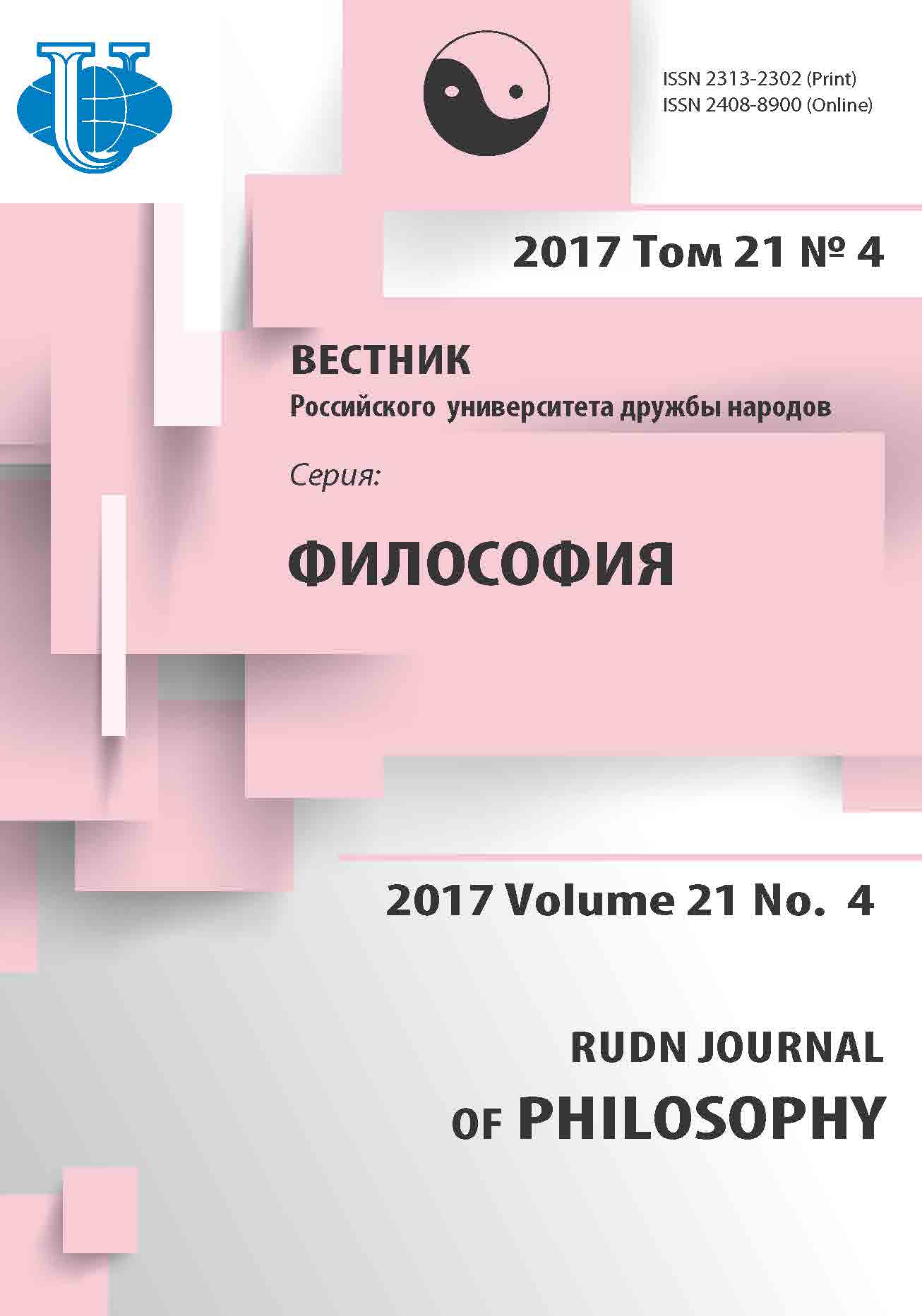TO THE QUESTION OF STRATEGIES IN HUMANITIES (A Case Study of the Russian Latin American Studies). Part 1
- Authors: Bondar OY1
-
Affiliations:
- RUDN University (Peoples’ Friendship University of Russia)
- Issue: Vol 21, No 4 (2017)
- Pages: 514-523
- Section: Articles
- URL: https://journals.rudn.ru/philosophy/article/view/17662
- DOI: https://doi.org/10.22363/2313-2302-2017-21-4-514-523
- ID: 17662
Cite item
Full Text
Abstract
The author of the article focuses on the concept of cultural synthesis, which is the key con-cept for the Russian Latin American studies. The author sets the questions of determining the semantic field of the very concept of “cultural synthesis”, of the possibility or impossibility of (culture) generating (a type of) interaction and its boundaries in the case of (historically) diverse cultural traditions encountered in the lands of the New World. The author reveals the different levels of the solution to the problem, offered by the Russian Latin American studies. The criticism of the “pre-theoretical” setting is offered, genetically related to the attempts of the continental cultural and philosophical reflection to comprehend the phenomenon of the miscegenative culture. The interpretative models are revealed, that arose in the Russian cultural and socio-cultural sys-tematical analysis, in which the rejection of one-dimensional socio-historical explanatory schemes occurs. The author offers the rethinking and reassessment of general theoretical and historical approaches, which will allow to identify and represent the process of the cultural genesis in Latin America in its original imbalance, non-linearity and abnormality. The author brings to light theoretical and methodological resources of the civilizational discourse, discussing the possibility of their application to the analysis of the given problem. Special attention is paid to the typological features of classical objects, formed “monoliths”, and becoming of non-classical borderline formations. In the framework of the borderline civilizations concept, the author introduces the vectors of the search for the problem solution, set by the ontological (static) and historical (dynamic) approaches.
About the authors
O Y Bondar
RUDN University (Peoples’ Friendship University of Russia)
Author for correspondence.
Email: bondar_oyu@rudn.university
Бондарь Ольга Юрьевна - кандидат философских наук, доцент кафедры социальной философии Российского университета дружбы народов
6, Miklukho-Maklaya St., 117198, Moscow, Russian FederationReferences
- Аguirre Rojas CA. América Latina en la encrucijada. Los movimientos sociales y la muerte de la política moderna. Moscow: Crug; 2012. (In Russ.)
- Girin YN. Was there a Synthesis? In: Latin American Culture in the Discussions of the 20th — early 21st century. Moscow: IMLI RAN; 2009. p. 430—431. (In Russ.)
- Girin YN. To the Question of Self-Identification Models of Latin American Culture. In: Iberica Americans. Mechanisms of Culture Genesis in Latin America. Moscow: Nauka; 1994. p. 42—54. (In Russ.)
- Zemskov VB. Introduction. The Literary Process in Latin America. ХХ Century end Theoretical results. In: The History of Latin American Literatures. ХХ Century: 1920s—1990s. Vol. 4. Part 1. Moscow: IMLI RAN; 2004. p. 5—106. (In Russ.)
- Zemskov VB. Introduction. On Inter-Civilization Interaction. In: Iberica Americans. Mechanisms of Culture Genesis in Latin America. Moscow: Nauka; 1994. p. 5—10. (In Russ.)
- Zemskov VB. Latin America and Russia. The Problem of Cultural Synthesis in Borderline Civilization. Social Sciences and Contemporary World. 2000;(5):96—103. (In Russ.)
- Zemskov VB. On Literature and Culture of the New World. Moscow: Center for Humanitarian Initiatives; 2014. (In Russ.)
- Zemskov VB. From the Study of the Literary Process to Understanding the Civilizational Paradigm. In: Latin American Culture in the Discussions of the 20th — early 21st century. Moscow: IMLI RAN; 2009. p. 360—392. (In Russ.)
- Zemskov VB. Civilizational and Cultural Borderland — Universal Constant and Means of Self-Creation of the Global Historical-Cultural Process. In: Problems of Cultural Borderlands. In Memoriam V.B. Zemskov (1940—2012). Moscow: IMLI RAN; 2014. p. 13—21. (In Russ.)
- Kofman AF. The Problem of Synthesis in the Latin American Culture. In: Latin American Culture in the Discussions of the 20th — early 21st century. Moscow: IMLI RAN; 2009. p. 393—398. (In Russ.)
- Kofman AF. In Memoriam V.B. Zemskov. In: Problems of Cultural Borderlands. In Memoriam V.B. Zemskov (1940—2012). Moscow: IMLI RAN; 2014. p. 6—8. (In Russ.)
- Kuteyshikova VN. Preface. In: The Writers of Latin America about the Literature. Moscow: Raduga; 1982. p. 3—16. (In Russ.)
- Kuteyshikova VN. Creative Works of el Inca Garcilaso de la Vega. In: History of the Literatures of Latin America. From the Earliest of Times till the Beginning of the Independence War. Vol. 1. Moscow: Nauka; 1985. p. 316—334. (In Russ.)
- Shemyakin YG. Latin American Civilization and Latin American Literature. In: Latin American Culture in the Discussions of the 20th — early 21st century. Moscow: IMLI RAN; 2009. p. 445—461. (In Russ.)
- Shemyakin YG. At the Origins of the Cultural Synthesis Process: The Interaction of Spanish and Indian Worlds in the Age of Discovery and Conquest of America. In: America after Columbus: the Interaction between two Worlds. The Problems of Indian Studies. Moscow: Nauka; 1992. p. 103—112. (In Russ.)
Supplementary files















